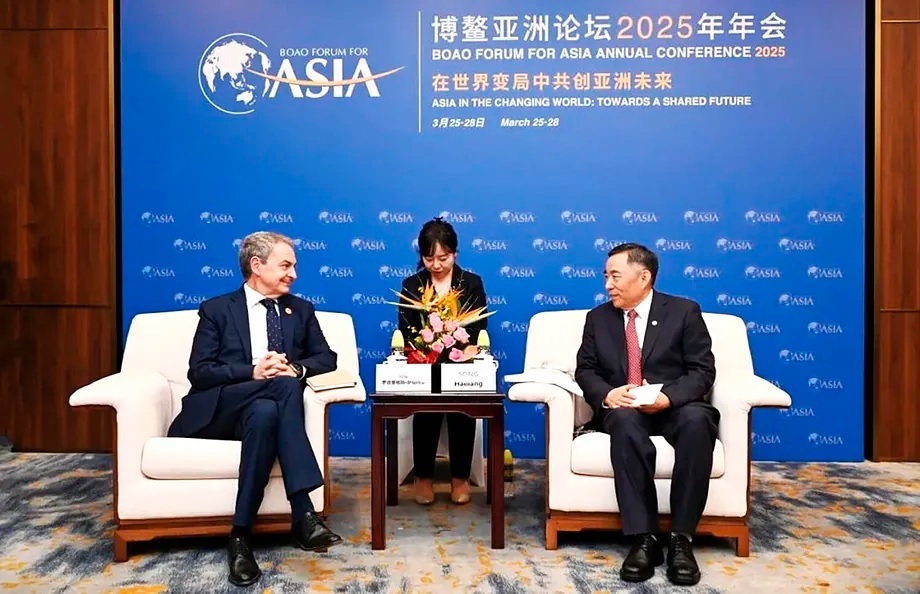"José Luis Rodríguez Zapatero, an old friend of the Chinese people, has played a prominent role in politics, both in Spain and internationally. During his administration, he actively promoted structural adjustment and internal reform, improving Spain's competitiveness in the global economic landscape." This was the introduction made by officials from the Chinese Communist Party (CCP) in the city of Guiyang, in the south of the Asian giant, when the former Spanish president visited them at the end of last year to participate in a symposium. Zapatero praised the successful policies of the Chinese government to improve the lives of its people, such as those that had lifted half a million people out of poverty in record time in the region where he was.
The praise is mutual. In Beijing, they hold the Spanish leader in high regard, the first in Europe to support the end of a 15-year arms export embargo to China, in place since the Tiananmen massacre in 1989. The Chinese, who at the time of Zapatero were neither close to being the superpower they are today nor had a long list of alliances and countries tied by debt, do not forget these details. Nor do they forget the socialist's intervention for Telefónica to adopt Huawei's 5G network amid suspicions in Europe about the close connections with the regime of the telecommunications giant.
A few days ago, in a conversation with this newspaper, a delegate from the CCP of a major state-owned company said that Zapatero was a kind of precursor to the diplomatic part of China's flagship foreign policy project today, the new Silk Road (The Belt and Road Initiative, the official name).
"He promoted the United Nations program of the Alliance of Civilizations, which was based on the need to build bridges between different peoples and the defense of multilateralism, which is what China advocates," he said. In the political scene in Beijing, especially in the main advisory body, the Spaniard maintains an old idyll with veteran members of the omnipresent ruling party who, although no longer at the forefront of decision-making, still have some influence within their circle and many are placed on the boards of directors of important state and private companies.
What do they say about Zapatero in the Spanish and European diplomatic scene in the capital of China? "Without holding an official position or having a fixed headquarters in Beijing, he is being the best ambassador Spain has ever had in this country, in terms of strengthening ties and successfully mediating for Spanish commercial interests," says a Spanish diplomatic source. A representative from the EU office in Beijing adds important nuances: "For almost all European countries, especially in these times of trade wars, it is essential to have China as a stable trading partner. But there are countries that are more aware than others of the risks of getting too close to Beijing. No matter how attractive its packaging may be, we must not forget that we are dealing with a dictatorship. And we cannot promote alliances with dictatorships. Therefore, it is unsettling that a figure like Zapatero, who is very influential in the Spanish government, is behaving like an activist on his many trips to China."
The consulted Spanish diplomatic sources are clear that Zapatero's frequent walks in the Asian superpower have been key for Pedro Sánchez to return to Beijing this Friday for the third time in two years. Since the pandemic, no EU leader has visited the Asian giant as many times.
Sánchez will be received by his counterpart Xi Jinping a couple of weeks after a trip by Zapatero to China, in this case, to the Boao Forum, a meeting between international business and political leaders on Hainan Island. The former Spanish leader held meetings with high-ranking CCP officials and acted as a liaison between Spanish companies and Chinese state-owned firms like China Energy, a conglomerate that has invested in several renewable energy projects in Spain.
It is no secret the lobbying that Zapatero does in China through the Gate Center think tank, where he serves as chairman of the advisory board, and the ONUART Foundation, based in Barcelona, where he acts as chairman of the advisory board. Both organizations, linked to Chinese entrepreneurs close to Beijing, promote Chinese projects under the umbrella of the new Silk Road, especially in Latin America.
